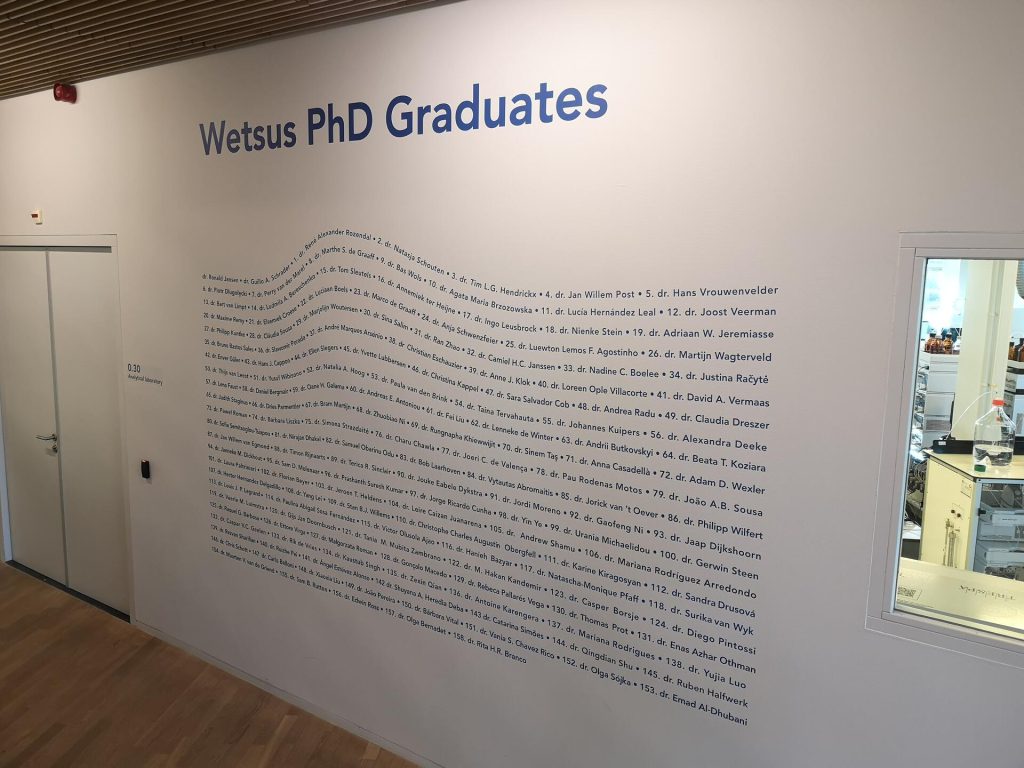Receive a full salary according to the Collective Labour Agreement of Dutch universities.
Conduct multidisciplinary research with high impact in society.
Develop your soft and transferable skills with a dedicated training plan.
Conduct research in cutting-edge labs with advanced equipment and expert technical support.


“At Wetsus, I thrive in a collaborative environment harmonizing nature and innovation. Our wetland surroundings inspire cutting-edge water technology research, supported by expert teams and global networks. Join a community where your PhD becomes a launchpad – advancing science, sustainability, and your career simultaneously.”
Han Liu – Engineered nature-based systems to remove organic micropollutants from surface water prior to its infiltration in the aquifer
“At Wetsus, I learned so many things: developing experiments in a big lab with technical and analytical support, supervising students, talk to industry partners, and about the many cultures that work together here.”
Sophie Banke – Transformation of phosphorus precipitates in manure to vivianite for recovery
“Wetsus has exposed me to a top-notch research environment with state-of-the-arts research equipment. The interface between academia and industry makes the research practical and fulfilling, knowing that I am working on solutions that have immediate applications in industry.”
Elorm Obotey Ezugbe – Efficient removal of nanoplastics from water through enhanced coagulation
 -Sophie Banke“>
-Sophie Banke“>
 -Elorm Obotey Ezugbe“>
-Elorm Obotey Ezugbe“>
 -Yizhou Xing“>
-Yizhou Xing“>

If you’re looking for a PhD position in Amsterdam, consider Leeuwarden as an excellent alternative. Just over an hour from Amsterdam, Leeuwarden offers a high-quality research environment with affordable living, a strong academic network, and a vibrant international community.
As the Cultural Capital of Europe in 2018, Leeuwarden combines history, innovation, and a great quality of life:

Perfluoroalkyl and Polyfluoroalkyl Substances (PFAS) are persistent pollutant which can accumulate in the residual sewage sludge during wastewater treatment processes. This PhD project aims to improve current destruction processes (i.e. gasification, pyrolysis) performances in order to achieve PFAS complete removal without the generation of toxic by-products.
Click for more info or apply for this position
Wastewater is often rich of N and P, valuable compounds that can be recovered during the treatment in sewage plants and re-used. This PhD project aims to create a brand-new adsorption technology for the simultaneous recovery of N and P species from treated wastewater effluents, minimizing the use of chemicals and re-thinking treatment plants with a circular approach.
Phosphate recovery from waste is nowadays of essential importance to satisfy the daily need of phosphate across the globe. As leaders in the research on phosphate recovery in the form of the iron-phosphate mineral vivianite, we developed Vivimag®, a technology to extract vivianite magnetically from sludge. This PhD project aims to create valorisation routes for the recovered vivianite, improving purification and further characterization of the different crystals.
Dewatering of sewage sludge is a major challenge for wastewater treatment plants, often achieved employing polymeric polyelectrolytes (PE). Dewatering efficiencies of those PE are not always satisfactory. This PhD project aims to understand interactions between sludge and PE by building and analysing a significant dataset from real-scale treatment plants. Advanced data analysis will help developing predictive tools for the operators to optimize sludge dewatering processes.
The availability of clean water in cities is essential for our society, but under increasing stress. Managing the several threats potentially hampering both water quality and quantity requires real-time monitoring. As part of the European Project UrbanM2O, using the cities of Copenhagen, Zürich, and Barcelona as real case scenarios, this PhD project aims to merge multiple lab- and real- scale sensoring data to generate new AI-enhanced, resource-effective monitoring tools for urban water quality.
Wastewater treatment plants (WWTP) are an essential infrastructure to support the availability of safe and clean water to urban areas. Efficient removal of micropollutants at WWTP will require more energy in the near future. This PhD project will focus on implementing new teal-time monitoring tools for real-wastewater composition across WWTP, aiming to understand current removal dynamics and make WWTP more resilient to sudden changes.
Despite the lack of extensive scientific validation at real-scale, coagulation and flocculation are nowadays considered a standard approach to remove suspended solids from water after several processes. This approach may indeed not be effective against (potentially harmful) micro- and nanoparticles. This PhD project aims to improve understanding of coagulation/flocculation processes generating and analyzing relevant datasets, subsequently leading to new, effective kinetic and data-driven models that can help to optimize the process.
Your PhD position will be funded by Wetsus, meaning that you will receive a monthly salary and full employee benefits as part of your 4 years contract.
A monthly salary according to the Collective Labour Agreement of Dutch Universities Offering health insurance by a collective agreement and collective pension regulation.
35 paid holidays, 13th-month salary and 8% holiday pay
Wetsus encourages a healthy balance between work and personal life. We provide social events, flexible working conditions, and a supportive research environment.
Wetsus will help you in finding an accommodation. Various options are available in Leeuwarden:
Wetsus has a strong alumni network, with graduates pursuing careers in:
htLeeuwarden is a student-friendly city with a mix of historic charm and modern amenities. Just over an hour from Amsterdam, it offers:

 – Han Liu“>
– Han Liu“>